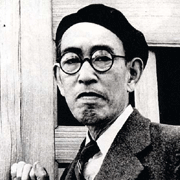Lives of the Edo Poets

Nagai Kafû (1879-1959) wrote Shitaya sôwa in the late 1920’s, after the great Kantô earthquake had burned up most of what was left of old
This nostalgia sometimes leads Kafû to start complaining about the declining character of this modern Taishô era, rather unbecoming for
枕山の詩賦には毎篇酒の一字を見ざるは罕〔まれ〕である。この年枕山は「酒痴歌」と題する長句を作って梅痴上人に示した。その引〔いん〕に曰く「余ガ性、酒ヲ飲ンデ少シク量ヲ過スヤ則チ省記スル所ナク、殆〔ほとん〕ド健忘者ニ類ス。寓院ノ主梅痴上人毎夕飲ヲ許ス。上人ハ灯ヲ点ジテ韻ヲ検シ、余ハ座傍ニ酌ム。一句ヲ得ルニ及ンデコレヲ余ニ質〔ただ〕ス。余已〔すで〕ニ沈酣〔ちんかん〕シテ何ノ語タルヲ弁ゼズ。答フル所アルイハソノ問フ所ニ異ル。然リトイヘドモ上人ノ寛懐固〔もと〕ヨリコレヲ罪ゼズ。余醒メテ後赧然〔たんぜん〕トシテ自ラ愧ズ。因ツテ酒痴ノ歌一篇ヲ作リ以テ上人ニ謝シ兼テ自ラ嘲〔ちょう〕ヲ解クトイフ。」わたくしはこの引を読んで清絶言うべからざる思に打たれた。芝山内の僧房に老僧は端座して詩巻を攤〔ひら〕き、年少の詩人は酒盃を手にして灯下に相対している光景が歴然をして目に浮び来った故である。(84-85頁)
It’s pretty rare to find a poem of Chinzan’s that doesn’t use the word “wine” somewhere. This year [1843], Chinzan wrote a long piece called “The Drunkard’s Song” for the monk Baichi. In the preface he wrote, “I’m the sort of fellow that, whenever I drink a bit too much, I can’t remember a thing afterward. Abbot Baichi of the temple I’m staying at allows liqueur every night. He lights the lamp and puzzles over rhymes, and I sit beside him and pour the wine. Whenever he comes up with a couplet he asks my opinion, but I get so drunk I can’t follow him, and my answer is sometimes to a different question all together. However in his kindness the abbot has never blamed me for this. After I come to my senses I’m quite ashamed of myself, so I’ve written this ‘Drunkard’s Song’, both to apologize to the abbot and to relieve my humiliation.” When I read this preface I was struck by a feeling of unspeakable purity, for I saw clearly before me the image of a mountain monastery where an old monk kneels and unfurls a scroll, while a young poet with wine cup in hand sits across from him under the lamplight.
On a side note, Kafû was apparently inspired to do this sort of archival work by similar books of Mori Ôgai’s, whom Kafû deeply admired. I really find this pairing fascinating, they seem to relate to society in completely opposite ways, but they must have had something in common (apart from apparently each having abandoned a foreign mistress to return to Japan of course).


1 Comments:
Very charming and informative post. I hope you'll post more about Kafu in the future. Regards, Beholdmyswarthyface
Post a Comment
<< Home